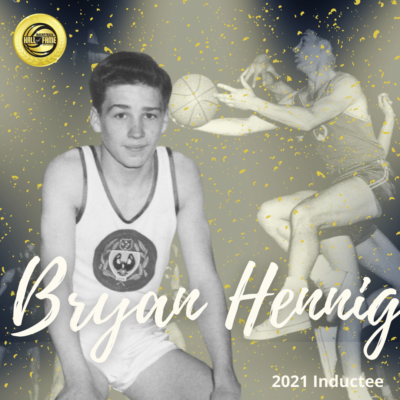Bryan Hennig won the Woollacott Medal as the fairest and most brilliant player in South Australia in 1961 – exactly 60 years ago.
A lifelong lover of the sport, being deemed as “too short” never was a deterrent for Bryan. If anything, it motivated him to become highly skilled and a high achiever in the game.
Already a pocket dynamo as a youngster, Bryan was selected to represent South Australia at the historic first Australian Under-18 Junior Championship in 1954 and again as a top age junior in 1955.
Equally excited by the prospect of coaching, in 1953 – even before his arrival at under-18 level as a player – he was the inaugural coach of the Falcons team which competed in the OBI’s Women’s League.
They finished second to the powerful Vikings, Bryan holding down the coaching role for three years with the Falcons.
Rising in stature as a player in his own right, Bryan was selected for the senior South Australian team from 1957-1962, winning the national championship in 1957-1958-1959-1960.
By 1961, Bryan had established his presence on the national scene and was first part of the Australian All States team which toured New Zealand, before being selected to represent Australia at the FIBA World Championship in Manila, Philippines, in 1962.
When Philippines President Diosdado Macapagal refused to issue visas to players from Communist countries such as Yugoslavia, FIBA pulled the pin on the tournament and instead re-assigned it to Brazil in 1963.
And while there was a World Series in Rio in 1963, those nations chosen to compete in 1962 in Manila went ahead anyway and played the now non-sanctioned World Championship.
Matches were held at the 30,000 seat Big Dome in Manila and Bryan’s teammates on the Boomers team included Lindsay Gaze, Barry Barnes, Mike Dancis, Ken Cole, Billy Wyatt, John and Mal Heard and John Hody.
In 1964, by which time Bryan had moved to Tasmania – which he represented at Australian Championships from 1963-1968 – he looked an absolute certainty to be selected on the Australian team bound for the Tokyo Olympic Games.
His chances for selection on what would become one of Australia’s most famous and successful early international teams, seemed assured during the Australian Championship at Adelaide’s Forestville Stadium.
As the weeklong tournament among the states concluded, Bryan was named as the carnival’s “best and most brilliant player” – the forerunner of the Most Valuable Player award. Naturally, it was assumed he would also be named in the 12-man Boomers team for Tokyo but in one of the most controversial and shock decisions of the time, his name was the notable absentee.
With South Australia winning the Final from Victoria, and NSW third, Bryan apparently had no allies around the selection table, the Olympic team comprised of players from those state teams.
In any review of the history of the Norwood Basketball Club, Bryan’s role in it is profound and exemplary. Apart from a brief stint in 1960 spent with the Latvian-based Venta club, Bryan played for two clubs in South Australia – Norwood and the Hungarian-based Budapest.
He was perfectly placed when the two clubs merged many years later to form the Norwood-Budapest Basketball Club, Bryan later even turning to administration as the club’s president for 15 years from 1969.
Starting at Norwood, he crossed over to Budapest in 1957 and played on the Hungarian club’s OBI State championship winning teams of 1957 and 1958.
When Budapest joined the District and Metropolitan Amateur Basketball Association, Bryan was a key member of its 1961 and 1962 State championship-winning teams and its 1963 runner-up.
Returning to South Australia from his years in Tasmania, Bryan coached South Australia’s Under-18 state team in 1972 and 1973.
Bryan still also was playing at top level with Norwood-Budapest (which eventually eased the Budapest name into retirement) from 1968 to 1973.
A hustling, fearless defender with wicked quickness and a copybook jumpshot, he has been a regular participant in Masters Games since 1988 and as one of the all-time greats in South Australian basketball, is a worthy recipient of BSA Hall of Fame induction in the Class of 2021.
